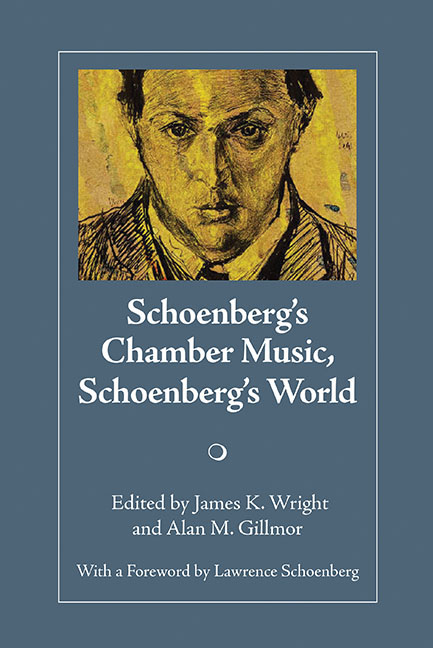Book contents
- Frontmatter
- Contents
- Foreword
- Preface
- HISTORICAL PERSPECTIVES
- ANALYTICAL PERSPECTIVES
- Schoenberg as Webern: The Three Pieces for Chamber Orchestra, III (1910)
- Juxtaposing Popular Music in the Second String Quartet, Op. 10
- A Chronology of Intros, an Enthrallogy of Codas: The Case of Schoenberg's Chamber Symphony, Op. 9
- Schoenberg's First Chamber Symphony, Formalism, and Adorno's Critique of Twelve-Tone Composition
- Precedents of Schoenberg's Compositional Practice in the Chamber Works of Joseph Haydn
- OTTAWA SYMPOSIUM AND CHAMBER MUSIC FESTIVAL PHOTOS
- PERFORMANCE, RECEPTION, AND INTERNATIONAL INFLUENCE
Juxtaposing Popular Music in the Second String Quartet, Op. 10
from ANALYTICAL PERSPECTIVES
- Frontmatter
- Contents
- Foreword
- Preface
- HISTORICAL PERSPECTIVES
- ANALYTICAL PERSPECTIVES
- Schoenberg as Webern: The Three Pieces for Chamber Orchestra, III (1910)
- Juxtaposing Popular Music in the Second String Quartet, Op. 10
- A Chronology of Intros, an Enthrallogy of Codas: The Case of Schoenberg's Chamber Symphony, Op. 9
- Schoenberg's First Chamber Symphony, Formalism, and Adorno's Critique of Twelve-Tone Composition
- Precedents of Schoenberg's Compositional Practice in the Chamber Works of Joseph Haydn
- OTTAWA SYMPOSIUM AND CHAMBER MUSIC FESTIVAL PHOTOS
- PERFORMANCE, RECEPTION, AND INTERNATIONAL INFLUENCE
Summary
Arnold Schoenberg's infamous quotation of the old Austrian tune, “Ach, du lieber Augustin,” in the Scherzo of the Second String Quartet, Op. 10, marks the occasion in which he first used pre-existing and popular materials in a mature work (Example 1). He knew that this crossover into a vernacular language would catch his listeners’ attention; any Viennese audience, too, would have been familiar with the apocryphal tale of Augustin, the alcoholic musician (a bagpiper in some versions) who became so stupefied while doing the rounds of the inns during the 1681 plague that he was taken for dead and thrown into a pit for victims having succumbed to the epidemic. According to some accounts, Augustin awoke from his stupor the next day, climbed out of the pit, and composed the folk tune with its text “O, dear Augustin, all is undone”—an ironic ode to life.
Virtually every commentator on the Quartet since 1909 has been captivated by “Augustin” and seems to have a different interpretation of its words. Musicologist Philip Friedheim and composer-theorist Ethan Haimo, for instance, consider the tune and the text to be a joke—they cite Schoenberg's own description of the passage as combining themes in a “tragicomic manner.” Whereas Reinhold Brinkmann, Elmar Budde, and Walter Frisch see “Augustin” as an entirely serious matter—a metaphor pointing to Schoenberg's awareness of the fact that he had pushed tonality to its limits. Michael Graubart, Rudolf Kolisch, Dika Newlin, Bryan Simms, and Hans Heinz Stuckenschmidt claim that the text comments on the tension in Schoenberg's marriage.
The strong historical and extra-musical interest in “Augustin” is indubitably predicated on Schoenberg's desire to shock his audience by the juxtaposition of a popular melody within the context of a contrapuntally dense, extended tonal work. I will argue that Schoenberg's notion of musical juxtaposition in vernacular music—a topic he pursued in many compositions, arrangements, analyses, and commentaries—intersects with his understanding of purely classical works, thus capturing compelling and novel conceptions of musical form. After a general scrutiny of Schoenberg's theoretical, historical, and extra-musical involvement with popular music in his own works and others, I shall turn to ideas of juxtaposition in the classical form of the Scherzo from Brahms's Fourth Symphony and the “crossover form” as exemplified by the intrusion of “Augustin” in the Second String Quartet.
- Type
- Chapter
- Information
- Schoenberg's Chamber Music, Schoenberg's World , pp. 65 - 96Publisher: Boydell & BrewerPrint publication year: 2009
- 2
- Cited by



